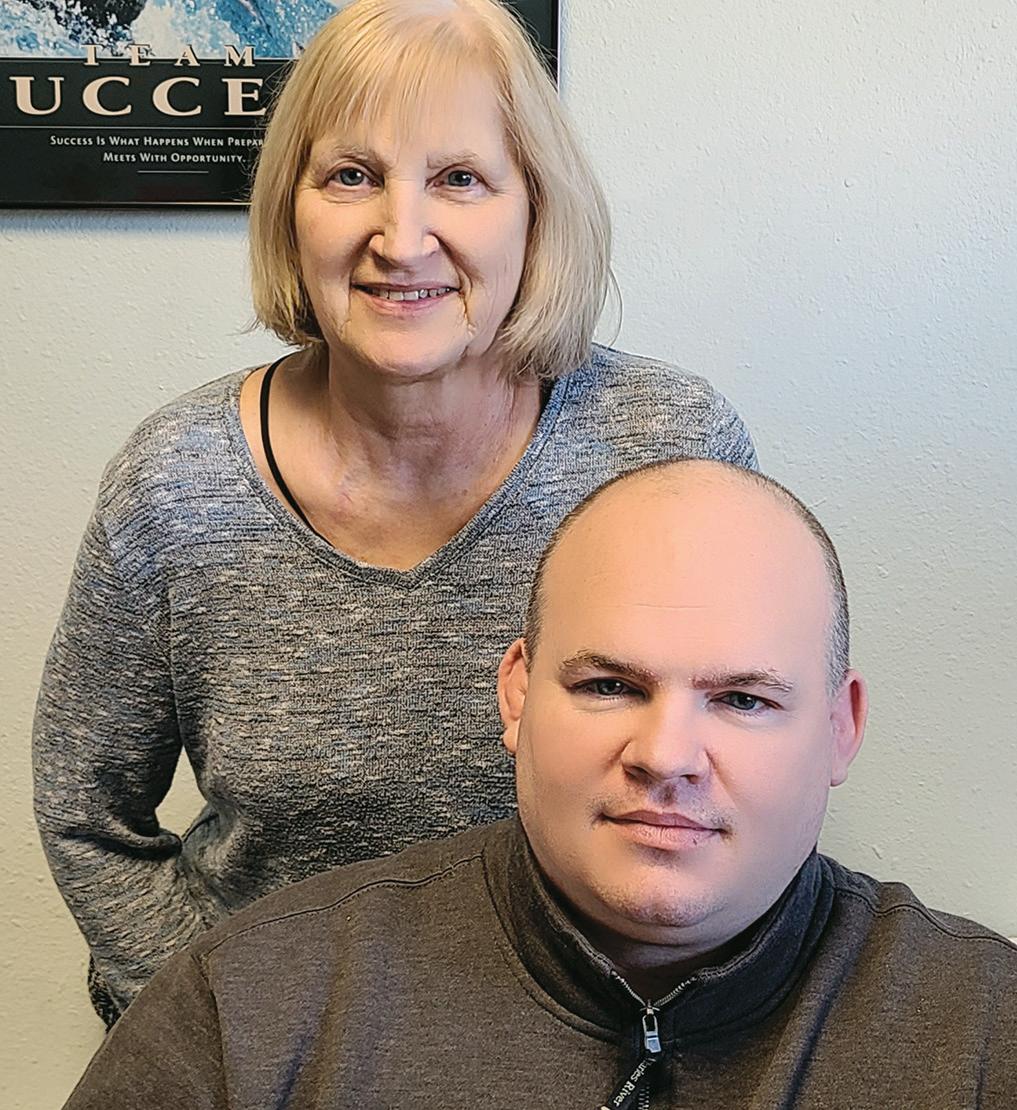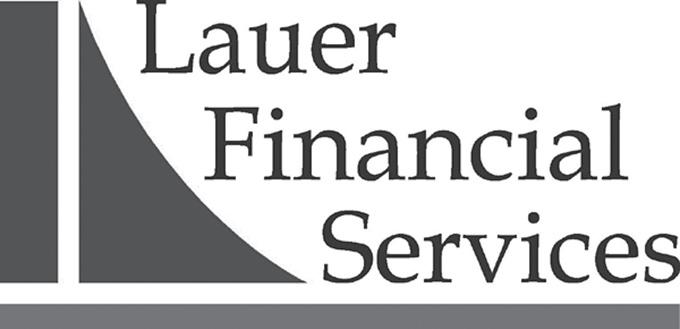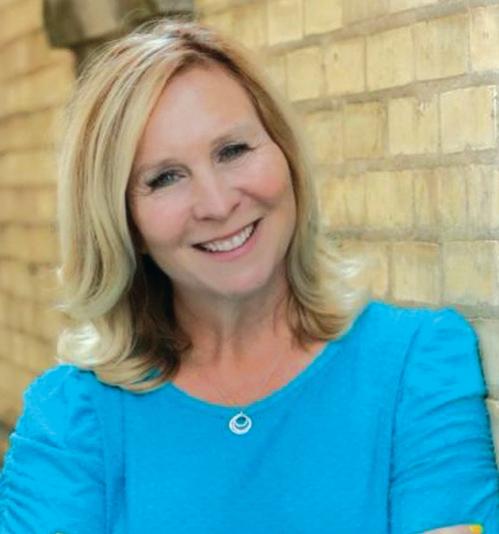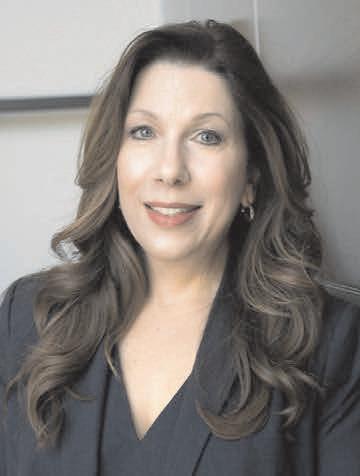





IN YOUR FUTURE Investing Published by Southern Lakes Newspapers 2023
Securities offered through Raymond James Financial Services, Inc., member FINRA/SIPC. FORM Wealth Advisors is not a registered broker/dealer, and is independent of Raymond James Financial Services. Investment Advisory Services are offered through Raymond James Financial Services Advisors, Inc.

Tyson Ray was named to the 2022 and 2021 edition of the Forbes Best in State Wealth Advisors. The Forbes ranking of Best-In-State Wealth Advisors, developed by SHOOK Research, is based on an algorithm of qualitative criteria, mostly gained through telephone and in-person due diligence interviews, and quantitative data. Those advisors that are considered have a minimum of seven years’ experience, and the algorithm weights factors like revenue trends, assets under management, compliance records, industry experience and those that encompass best practices in their practices and approach to working with clients. Out of approximately 34,925 nominations received, based on thresholds, more than 6,550 advisors received the award. Portfolio performance is not a criteria due to varying client objectives and lack of audited data. Neither Forbes nor SHOOK receives a fee in exchange for rankings. This ranking is not indicative of advisor’s future performance, is not an endorsement, and may not be representative of individual clients’ experience.


Neither Raymond James nor any of its Financial Advisors or RIA firms pay a fee in exchange for this award/rating. Raymond James is not affiliated with Forbes or Shook Research, LLC. Please visit https://www.forbes.com/best-in-state-wealth-advisors for more info.
Tyson Ray
was named to the 2022 edition of the Barron’s Top 1200 Financial Advisors list. Barron’s “Top 1,200 Financial Advisors,” March 2022. Barron’s is a registered trademark of Dow Jones & Company, L.P. All rights reserved. The rankings are based on data provided by over 5,000 individual advisors and their firms and include qualitative and quantitative criteria. Factors included in the rankings: assets under management, revenue produced for the firm, regulatory record, quality of practice and philanthropic work. Investment performance is not an explicit component because not all advisors have audited results and because performance figures often are influenced more by clients’ risk tolerance than by an advisor’s investment picking abilities. The ranking may not be representative of any one client’s experience, is not an endorsement, and is not indicative of advisor’s future performance. Neither Raymond James nor any of its Financial Advisors pay a fee in exchange for this award/rating. Barron’s is not affiliated with Raymond James. Experience a different kind of wealth conversation. After 25 years, numerous accreditations and the recognition of national outlets, we’ve learned to do things differently. Speak with us to find out how we help make life better for our clients, and why we’re grateful for the privilege. 25+ YEARS OF EXPERIENCE Tyson Ray CFP®, CExP®, CIMA® FORM | Founding Partner Senior Wealth Advisor 25+ YEARS OF EXPERIENCE Luke Kuchenberg CFP®, CPWA® FORM | Founding Partner Senior Wealth Advisor 10+ YEARS OF EXPERIENCE Christine Hayward MBA, CISSM FORM | Partner Wealth Advisor Lake Geneva Office 431 Geneva National Ave. South Lake Geneva, WI 53147 (262) 686-3005 Middleton Office 6727 Frank Lloyd Wright Ave. Middleton, WI 53562 (608) 836-5133 Kenosha Office 5707 6th Ave. Kenosha, WI 53140 (262) 652-7535 www.formwealth.com 431789
Build a budget that works for you
Financial trends come and go, and it appears as though one approach to finance that industry professionals have long touted is having a moment.
According to Debt.com, 86 percent of the more than 1,000 respondents who participated in the site’s annual budgeting survey admitted they budget their spending. That marks a roughly 16 percent increase since 2019.
If budgeting is getting a star turn in individual financial planning, it’s well deserved. Budgeting can help people save money and achieve an assortment of financial goals, including paying down debt, financing tuition and planning a dream vacation.
Each person’s budget will be different, but that doesn’t mean people need to take wholly unique approaches to building a budget. In fact, a conventional approach to budget-building can help people from all walks of life.
Determine your net income
The Bank of America notes that net
income, also known as “take-home pay,” is the foundation of a budget. In the era of direct deposit, it can be easy for anyone to forget how much money they’re taking in each month. Salaried workers can determine their net income pretty quickly and easily, while workers who are paid by the hour and freelancers may need to do a little extra work and serve as their own bookkeepers as they try to calculate their net incomes.
Monitor your spending
Spending habits fluctuate, but some patterns will likely develop over time, and identifying these patterns is vital to building a budget. Individuals needn’t wait to track their spending.


Log into your bank account and see how you spent money each month over the last six months to a year. This can give you an accurate idea of where your money went after it came in. Monthly utility bills may be constants, but those bills tend to fluctuate depending on the season, so a closer examination can yield what the
average cost is. Budgets may need to be tweaked during months when utility bills peak.
Budget for fun
Don’t discount the importance of things you want. It’s important when building a budget that money is left for more than just bills. Things you want to do like dine out, travel or additional expenses like entertainment should be built into your budget so you can still enjoy yourself and your budget is not blown up when opportunities to have fun inevitably arise.
Track and tweak
Progress can be tracked and the budget can be tweaked if you’re still having trouble saving or your efforts to save are causing issues. Tracking progress allows you to see what is and isn’t working, while tweaking affords room to compromise if the budget is proving too restrictive or not allowing you to meet your goals.
(METRO CREATIVE)
INVESTING IN YOUR FUTURE • 2023 • PAGE 3 A publication of Southern Lakes Newspapers LLC 1102 Ann St., Delavan, WI 53115 (262) 728-3411 EDITOR IN CHIEF: Tracy Ouellette CREATIVE DIRECTOR: Heather Ruenz ADVERTISING DIRECTOR: Vicki Vanderwerff SECTION DESIGNER: Jen DeGroot FOR ADVERTISING OPPORTUNITIES: Call (262) 728-3411 Investing Future IN YOUR A conventional approach to budgeting can help people achieve their financial goals and feel better about their futures. STOCK PHOTO Investing in Your Future
Saving strategies for young adults
When a person is young, saving money may be the furthest thing from his or her mind. After all, this may be a time to enroll in college or trade school, make a first big purchase, such as a car, or even get married. Thinking about establishing a solid financial footing for the future can take a back seat when life is filled with so many significant events.
But it’s never too early to start saving Ñ even when saving seems to be an impossible task. Young adults should keep saving in mind and look to various strategies that can set them up for long-term financial security.
Set long-term goals
It’s easier to save when saving is attached to specific goals. While some may aspire to retire early, establish an emergency fund or to purchase a home, others may want to save for an overseas vacation. Motivation to save can make it that much easier to do so.
Determine where you spend the most
Saving money on smaller purchases will add up over time, but to really build a robust savings, figure out your biggest expenditures and how you can cut back to pad your savings. The Logic of Money reports that the average American spends more than 60 percent of their income on housing and transportation. Figuring out how to cut costs in these categories can be a great way to save.
Use cashback apps
Young adults are tied to their digital devices. Why not make them work for you? Free cash back apps give you money back for various purchases.
Ibotta and Dosh are just two cashback apps available. Some can be linked directly to a credit or debit card to have passive income deposited directly. With others, you can cash out as a direct deposit or via a payment app like PayPal.
Set aside one-third of your income
Make it a point to put away $1 for every $3 earned into a savings account, advises U.S. News & World Report. That is a good measure for establishing a rainy day fund. If you don’t trust yourself to transfer the money, have a set amount automatically deposited from your paycheck into a designated savings account.

Treat credit cards like using cash
The “buy now, pay later” option is an attractive trap to fall into. Using credit cards often is a safer way to pay merchants, because you’re risking others’ money rather than your own with a debit card.
However, using credit can make it challenging
to visualize what you’re actually spending. Do not purchase more than you can pay off within each billing cycle. Set account alerts on your phone to let you know when you’ve hit your budgeted credit card spending limit. Resist the
urge to open and use too many cards.
Young adults can begin saving early with some conventional and highly effective strategies.

(METRO CREATIVE)
Young adults should establish healthy spending habits as soon as possible.
PAGE 4 • 2023 • INVESTING IN YOUR FUTURE
STOCK PHOTO Investing in Your Future
Budgeting for college?
Millions of college students are making a budget for school for the new year and taking charge of their finances for the first time. Managing money and homework can be stressful, especially with trying to make your money go further with recent inflation causing price hikes that may hit cashstrapped college students especially hard.
Here are some ways to make sure to stay on track financially this year:
Choose the best way to pay for things
When spending money, most people tend to think about how best to maximize their rewards. Rewards and cashback are great, but how you pay for things influences how much money you spend. That is especially true for college students who often manage their finances for the first time. Students can benefit from using a cash or debit card to get comfortable with spending, including keeping a budget and tracking expenditures, before moving on to a credit card.
This doesn’t mean giving up on earning rewards - many banks offer cashback for spending at certain retailers or offer rewards for using their products consistently. It’s critical to look at what each bank or debit card offers, as well as what types of fees they charge.
Make a budget & identify savings goals
Many people automatically assume budgeting means you cannot have any
fun or enjoy things, but having a budget can give you the freedom to enjoy things that matter as long as you keep the other things in check. One of the essential parts of an effective budget is figuring out what expenses to plan around. For college students, the most common expenses include:
• Apartment or dorm rent;
• Utilities, such as phone, electricity, water and internet bills;
• Books;
• Food/bars;
• Gas;
• Car maintenance;
• Clothes;
• Greek life or other social organization dues; and
• Season athletic tickets.
Every budget is unique to an individual, and so each person should make sure they are setting aside what they need for essentials but then prioritizing what is most important to them.
Outside of a core budget, the other essential to consider is savings goals. Having an emergency fund is vital for everyone, but in college, students need to plan for things like Spring Break or significant Greek life events or outings.
Most people only have two buckets of money, their spending in their checking account and all the money set aside for various goals in their savings. But most need more than that to help save money for multiple purposes. For instance, SoFi Checking & Savings¹ offers Vaults, allowing students to set cash into specific
WAYS YOUR BANK CAN HELP YOU NAVIGATE YOUR
goal-related funds within their savings account so they can easily monitor their savings toward each particular goal.
Use technology to monitor spending
Managing money can feel overwhelming, but college can be extra stressful with managing classes and navigating money management for the first time. But every college student has a phone in their hand more often than not, so it’s an excellent opportunity to deputize said phone to make monitoring spending and budgeting easier.
For instance, SoFi Relay², a financial insights tool, shows individual purchases made across bank accounts and credit cards linked to the platform, as well as spending trends throughout the month, categories people spend the most in, and how it compares to previous months and how someone is saving each month. This takes the burden of tracking spending and purchases manually off of students and makes it simple to keep an eye on spending habits and adjust budgets as needed.
Identifying the best financial partner
For students looking for a simple, allin-one way to spend and budget, SoFi Checking & Savings provides students flexibility, low costs and access to financial education and resources. When you bank with SoFi, members pay zero account fees and receive automatic savings features,

FINANCES
as well as vital resources on financial literacy and access to credentialed financial planners for bespoke advice on managing money.
Students can also earn up to 15% cash back at local establishments3 and access fee-free ATMs via the Allpoint network4, which offers over 55,000 ATMs across the country, allowing students to avoid fees, whether at home or on-campus. SoFi offers all these perks to both students and postgrads.
For more information, visit www.sofi. com/banking/students.
Disclosures
* SoFi Checking and Savings is offered through SoFi Bank, N.A.
* SoFi’s Relay tool offers users the ability to connect both SoFi accounts and external accounts using Plaid, Inc’s service. The credit score provided to you is a VantageScore based on TransUnion (the “Processing Agent”) data.
* Earn up to 15% cash back on local retailers. List of retailers may vary. See our terms and conditions.
* We’ve partnered with Allpoint to provide you with ATM access at any of the 55,000+ ATMs within the Allpoint network. You will not be charged a fee when using an in-network ATM, however, third-party fees incurred when using out-of-network ATMs are not subject to reimbursement. SoFi’s ATM policies are subject to change at our discretion at any time.
INVESTING IN YOUR FUTURE • 2023 • PAGE 5
(BPT)
One of the best ways to get the most for your money is to make a plan from the very start. STOCK PHOTO Investing in Your Future
Education continues to provide a sizable return on investment

A recent report from the Center on Education and the Workforce at Georgetown University revealed just how valuable a college degree continues to be.

As tuition costs at many colleges and universities rise and families wonder if investing in a college degree is as wise as it once was, the CEW report can reassure parents and their children that a college degree remains a valuable asset that pays significant financial dividends over the long haul.
According to the CEW report, adults with a bachelor’s degree earn an average of $2.8 million during their careers. By contrast, adults with a high school diploma earn an average of $1.6 million over the course of their careers, while those without a diploma earn $1.2 million in their lifetimes.
One key consideration for individuals concerns when education may not provide the expected financial return. Though people pursue advanced degrees for a variety of reasons, including the potential to earn more money over the course of their careers, the CEW study found that the average person with a master’s degree earns $3.2 million in their careers, or just $400,000 more than someone with a bachelor’s degree.
Retirement planning questions, answers
Individuals need not look very far to be reminded of the importance of planning for retirement. Television ad campaigns touting the need to plan for retirement have been front and center for many years.

Banks also heavily promote their retirement planning services to account holders. The emphasis financial firms and banks place on retirement planning underscores just how important it is for individuals from all walks of life to prioritize securing their financial futures.
Ad campaigns can make saving for retirement seem simple, but plenty of people may have questions about how to save for the days when they are no longer working.
Why and when should I begin investing to build my retirement savings?
It’s never too early to start saving for retirement. Young professionals may not be anywhere close to retirement, but that doesn’t mean they can afford to put off saving for the day when they call it a career. Much of that has to do with inflation.
The rate of inflation varies, but it’s fair to assume that your cost of living will rise dramatically between your 23rd birthday and your 17th birthday. If you choose to simply save as opposed to investing that money, your money will not grow at a rate necessary to overcome inflation.
Though there’s no guarantees with investing, traditional retirement investment vehicles have a proven track record of outpacing inflation. For example, Standard & Poor’s 500¨ (S&P 500) reports that individual retirement accounts (IRAs) grew by an average of 10.8% between 1971 and 2020. Over that same period, the U.S. Bureau of Labor Statistics indicates that the dollar had an average rate of inflation of 3.99%.
How can I save for retirement?
Various investment vehicles can help people save for retirement. Many people utilize employer-sponsored 401(k)
retirement plans. These allow individuals to deposit money via pre-tax contributions deducted from their paycheck.
For young people, enrolling in these plans as soon as they’re eligible can be a great way to begin building their retirement savings, and since many people contribute between 6% and 10% of their pre-tax earnings, their take-home pay will not be significantly different once they enroll. IRAs, pension plans, certain life insurance policies, and regular contributions to personal savings accounts are some additional aways to save for retirement.
How much will I need to save for retirement?
No two people are the same, so there’s no simple answer to this question. Estimates about how much people will need in retirement range from 60 to 80% of their yearly income the year they stopped working full-time.
A financial advisor can be a useful ally as people try to calculate how much they will need to save for retirement. However, the simplest answer to this common question is that there’s no such thing as saving too much money for retirement so long as saving does not adversely affect other areas of your life.
Though $400,000 is a significant sum of money, given the cost to obtain a master’s degree and the work required to earn it, some individuals, particularly those who would pursue such a degree solely to improve their earning potential, may not deem the investment worth their time or money. That’s a consideration for people given the average cost of a master’s degree, which the Education Data Initiative reports is slightly more than $66,000.
Field of study is another consideration for individuals curious about the return to expect when investing in education. The CEW report found that the median career earnings among individuals with a bachelor’s degree in architecture and engineering is $3.8 million, while individuals with a bachelor’s in education earn slightly more than half that amount ($2 million).
(METRO CREATIVE)
What
if I need money before retirement?
No law prohibits people from withdrawing funds from designated retirement accounts before they retire. However, there may be significant financial penalties and tax consequences if you do so.
For example, the Internal Revenue Service allows penalty-free withdrawals from a 401(k) after an account holder turns 591Ú2. Withdrawals made before then could be subject to federal and state income tax and a 10% penalty of withdrawn funds. Individuals are urged to speak with a financial advisor about withdrawal guidelines and penalties prior to opening a retirement account.
PAGE 6 • 2023 • INVESTING IN YOUR FUTURE
(METRO CREATIVE) Saving for retirement is vital and it’s never too early to begin investing in your financial future. STOCK PHOTO Investing in Your Future
STOCK
As the cost of higher education continues to rise, parents and students about to enter college should know that obtaining a college degree remains a worthy pathway to earning more money over the course of one’s life.
PHOTO Investing in Your Future
TIPS FOR GETTING READY TO buy your first home
or generations, homeownership has been synonymous with the idea of achieving the American Dream. This has certainly been true for many Hispanic Americans, who have used their homes to establish roots in their communities for their families.
More than 8.8 million Latino families now own homes across the United States, according to a recent report from the National Association of Hispanic Real Estate Professionals. The Latino homeownership rate is now more than 48%, a number that has been on the rise for the last several years.
Home buying experts say that many more Latinos are interested in buying homes but have pushed off the decision because they’re unsure if they can afford it or because they would like more education about the process.
AmeriSave Mortgage Corp., one of the nation’s fastest-growing home loan providers, offers the following five tips for first-time homebuyers.

Understand what you can do
Understand what your legal residency status enables you to do. You’re not required to be a U.S. citizen to qualify for a home loan. Anyone with permanent status – including certain non-U.S. citizen buyers – is eligible for a home loan. The best resource to determine what you can do is the comprehensive guide published by Fannie Mae.
Calculate what you can afford
The amount you can borrow is determined primarily by your monthly income and credit score. Typically, people with higher incomes and credit scores can borrow more than those with lower incomes and lower credit scores.
Online calculators can provide a general estimate of how much home you can afford and help you estimate your potential monthly mortgage payment. Not sure of your credit score? You can use a service like Experian, Equifax or TransUnion to learn where you stand.
Report verifiable income
Any income you report to a lender must be verifiable taxable income. Cash income is not considered part of your earnings, so if you’re being paid by an employer in cash, you should ask to be paid via their payroll system, either in the form of a physical check or direct deposit.
Similarly, if a large portion of your income comes from cash tips, talk with your employer about ensuring those tips are appropriately reflected on your W2.
Have the down payment
Regardless of how much you plan to borrow, you’ll need to set aside funds for a down payment and closing costs. Most lenders require 3% to 5% of the total purchase price, at minimum.
Any funds you use for this purpose must be in a bank account for at least 60 days prior to underwriting, so make sure you deposit any cash that you receive from working side jobs, from gifts, etc., before starting the mortgage process.
Many cities and counties across the United States also offer down payment assistance programs, which are intended to help first-time homeowners. Research these programs online as a first step.
Research options
Do your research and partner with a qualified and experienced loan originator. Purchasing a home is the biggest financial decision most people will ever make, so it’s important to have trust in and be comfortable with your mortgage lender. You can verify your lender is authorized to do business in your state through the free Nationwide Multistate Licensing System Consumer AccessSM page.
If English is not your preferred language, many mortgage lenders, including AmeriSave Mortgage, have Spanishspeaking loan originators who can guide you through the entire process and provide forms you can complete in Spanish. For more information, visit www. AmeriSave.com. (BPT – BY AMERISAVE MORTGAGE
INVESTING IN YOUR FUTURE • 2023 • PAGE 7
CORP.) The prospect of buying a home can be daunting. But a qualified, experienced lender can make the process much simpler and less stressful. STOCK PHOTO Investing in Your Future


PAGE 8 • 2023 • INVESTING IN YOUR FUTURE 800.667.4401 Member FDIC We understand family businesses because we are one. We are a family-focused bank that knows what it takes for businesses to thrive – local support, hard work, andSoundAdvice makes all the difference You can count on all the above from us. Give us a try.We’ll treatyou like family. Contact our SmallBusinessBanking team to learn more FAMILY BUSINESS Because we are one! Focused on Visit bankatfirstnational.com 411585 431788 FORMERLY NANCY BLACKMAN INSURANCE SPECIALIZING IN INSURANCE PRODUCTS FOR SENIORS Call Your Local Agent NICHOLAS BLAWAT 1-414-545-7878 1-800-924-4061 Allied Senior Services Insurance & Investments, ltd
What novices should know about day trading
Investing is a great way for people to secure their financial futures and ensure they have enough money to live full and happy lives, including during retirement. There’s no shortage of ways for individuals to invest, but one lesser known investment strategy could pique the interest of individuals who enjoy the thrill of investing.
Day trading is more exciting, and potentially nerve-wracking, than more traditional investment strategies that focus on long-term gains. According to the U.S. Securities and Exchange Commission, day trading involves actively buying and selling securities within the same day. That could excite individuals who may find it thrilling to be such an active investor, but it’s best that anyone considering day trading first understand why some people do it and the risk it involves.
Why do people get involved in day trading?
Though it’s best to avoid making assumptions about why day trading appeals to so many people, the chance to make a substantial amount of money in such a short period of time undoubtedly contributes to its appeal.
However, the SEC notes that the risks associated with day trading are substantially higher than long-term investment strategies. Much can happen over the course of a single market day, and that can leave day traders exposed to heavy losses.
Is day trading for novices?
The thrilling nature of day trading makes it appealing to investors at all levels of investing, whether it’s novices or seasoned investment professionals.


However, the SEC notes that professional day traders typically are highly
experienced individuals with extensive knowledge of markets, products and strategies. Such individuals are also wellversed in risk.
It’s also important to note that the very name of day trading can be misleading.
Though day trading is defined as buying and selling securities within a single day, the knowledge necessary to research markets, analyze products and monitor the news is not acquired overnight.
Despite its perception as a great way to
get rich quick, day trading actually involves considerable effort on the part of traders before the market opens. Thorough research is a hallmark of successful investing, and that applies to day trading as well.
(METRO CREATIVE)
COMMON INVESTMENT TERMS TO KNOW
The importance of investing is undeniable. That value was especially apparent throughout 2022, when inflation took center stage. As the cost of living rises, investors can more capably handle that spike because they’ve been growing their money through various investment vehicles all along.
With so much to gain from successful investing, novices may benefit from a rundown of common investment terms. They include:
401(k)
A popular way to save for retirement, a 401(k) is an employer-sponsored retirement plan. Individuals with a 401(k) make pre-tax contributions during each pay period and some employers match these contributions up to a certain percentage. Money in a 401(k) can be withdrawn at any time, but there is a penalty on withdrawals made prior to the account holder reaching 591Ú2 years of age.
Bear market
A bear market is a market in which stock prices sharply decline over a prolonged period of time. Bear markets may be
inspired by an array of factors, including rising unemployment.
Bonds
Bonds are a low-risk investment that attract novices who are not yet certain of their risk tolerance. Bonds are loans to governments and even corporations that pay interest to the individuals who invest in them.
Bull market
The opposite of a bear market, a bull market refers to a market in which stock prices are rising.
Diversification
Diversification is a savvy investment strategy in which investors spread out their investments so their portfolio is as diverse as possible. When diversifying, investors may invest in stocks, bonds, IRAs, a 401(k), and other vehicles.
Dividend
A dividend is a payment made to a shareholder in a company.
INVESTING IN YOUR FUTURE • 2023 • PAGE 9
STOCK PHOTO Investing in Your Future
The temptation to engage in day trading can be significant. However, the U.S. Securities and Exchange Commission urges individuals with little investment experience to embrace a more long-term investment strategy as they look to secure their financial futures.
STOCK PHOTO Investing in Your Future
Knowledge of basic investment terms can serve as a good foundation for novices who want to begin investing. As investors become more comfortable, they can expand their knowledge even further.
• CONTINUED ON PAGE 10
Know the basics of consumer credit
A strong credit score is an undeniable asset for consumers. A strong standing in the eyes of potential creditors can save consumers money on relatively shortterm expenses like vehicles and long-term purchases like homes.
Consumer credit is so influential in the lives of the average person that it pays to have some knowledge of what it is and how individuals can use it to their advantage.
Who issues consumer credit?
Consumer credit is typically issued by banks and retailers. One common question consumers have is who owns credit cards, which are among the most recognizable and widely used forms of consumer credit.
Many credit card companies, including Visa, are now publicly held companies after
INVESTMENT TERMS
IRA
An individual retirement account is a retirement account individuals open on their own. There are various types of IRAs, and contributions to these accounts are post-tax.
Market index
The Dow Jones Industrial Average is perhaps the most recognizable market
years of being owned by banks. However, many major banks, including Capital One and Bank of America, issue credit cards as well.
What is a credit score?
According to the credit reporting agency Equifax¨, a credit score is a three-digit number which represents an individual consumer’s credit risk. Credit risk refers to the likelihood that a borrower will pay their bills on time. Scores are typically between 300 and 850, and the higher the score, the more creditworthy and less risky a consumer is in the eyes of creditors.
How are credit scores calculated?

Three different consumer reporting agencies, including Equifax¨, determine
• CONTINUED FROM PAGE 9
index, though it’s not the only one. A market index such as the DJIA tracks the financial market by analyzing data from various companies.
Mutual funds
Mutual funds are a popular way to invest. According to the investment experts at J.P. Morgan Asset Management, with a mutual fund, money is raised by an investment company and is then invested
credit scores. That’s why it’s not uncommon for a single consumer to have three different scores.
Those scores should be similar, and if they’re not it’s likely that one or more CRA reports has an error or errors. A host of variables are considered when determining a credit score, and these include:
• Payment history;
• Credit utilization ratio, which is the amount of credit used versus the total available credit;
• Types of credit accounts a consumer has. This includes revolving credit accounts, like consumer credit cards, and installment accounts, which include mortgages and auto loans;
• Credit history length; and
• Frequency of credit inquiries (numerous inquiries in a short period of time generally
in a portfolio that includes stocks, bonds, options, commodities, or money market securities.
Share
The online financial resource Mint notes that a share is a unit of ownership in a company or in an asset. Shareholders are eligible for benefits, including payouts, when a company makes money.
Managing credit is a vital component of financial planning. Knowing the basics to consumer credit can set individuals on a sound financial path.
lower a consumer’s credit score),
So why is a credit score so important?
Credit scores are so significant because they can cost or save consumers a substantial amount of money. Consumers with poor scores, which are generally considered scores between 300 and 669, may not be eligible for auto or mortgage loans and may only be able to secure credit cards with high interest rates.
By contrast, consumers with scores considered very good to excellent (740 and higher) generally get more favorable interest rates on sizable purchases like cars and homes, which can save borrowers tens of thousands of dollars over their lifetimes. (METRO CREATIVE)
Stock Stocks are long-term investments that represent an ownership stake in a company. Most investors invest in common stocks, which are not subject to the same conditions as preferred stocks. Preferred stocks tend to be less volatile than common stocks, though that security also makes them less profitable when the stock performs well.
(METRO CREATIVE)
PAGE 10 • 2023 • INVESTING IN YOUR FUTURE
STOCK
PHOTO Investing in Your Future
Simple tips to improve your status with mortgage lenders
Owning a home is a dream shared by millions of people. Investing in property that can be owned within 15 to 30 years of closing on the home makes more financial sense to many than continuing to rent and having little to show for it over time.
The first step to take when planning to enter the real estate market is to ensure that your finances are in order. Various factors will influence individuals’ ability to secure a mortgage, and these are some ways to make yourself more attractive to prospective lenders.

Check your credit report
Lenders will check your credit report before deciding if you are a risk or a safe bet for a mortgage. So it makes sense to check your credit report prior to speaking with a lender. The Federal Trade Commission says everyone can get one free
credit report a year from each of the three credit reporting bureaus.
If you split it up, you can get a credit report every four months so you are aware of anything that may adversely affect your ability to get a mortgage loan. A credit score that’s too low may disqualify you from a mortgage. Each lender sets its own thresholds when they price and approve loans, but the higher your credit score, the better.
Improve credit standing
One way to improve your status in the eyes of lenders is to pay down credit card balances to reduce your credit utilization ratio. A high utilization occurs when there is a high balance in relation to the credit limit, says Business Insider. Also, it may be wise to avoid any credit inquiries through new credit card applications for several
months before applying for a loan, as these inquiries can affect your score.
Be realistic
Do your homework and determine your target interest rate and monthly payment as well as what down payment you can afford. It will help you research potential lenders and provide an idea of what may be offered to you.
Pay bills on time
Paying bills promptly not only helps you avoid late fees, but also positively affects your credit. The financial resource The Mortgage Reports urges diligence when paying rent, as late rent payments can bar you from getting a mortgage. Lenders look at rent history as the biggest indicator of whether you’ll make mortgage payments on time.
(METRO CREATIVE)
Did you know?
Prior to financing home improvement projects, homeowners typically consider a host of variables, including how significant a return they’re likely to get on their investment.
Though potential ROI is not the determining factor for most homeowners, the cost of home renovation projects is so significant that ROI certainly merits consideration.
According to Remodeling magazine’s 2022 Cost vs. Value Report, a garage door replacement recouped the highest percentage of homeowners’ initial investment in 2022. The average cost of such a project was $4,041 in 2022, and homeowners recouped roughly 93% of that investment at resale. (METRO CREATIVE)
INVESTING IN YOUR FUTURE • 2023 • PAGE 11 There are ways to make a prospective home buyer look better in the eyes of mortgage lenders. Individuals can speak with financial professionals about what else they can do to improve the possibility of securing mortgages at the best rates possible. STOCK PHOTO Investing in Your Future
OPTIONS TO FINANCE HOME IMPROVEMENTS
Renovating a home is a great way to impart personality indoors and out. Improvements can make spaces more livable and address safety issues. Home renovations often take residents’ lifestyles into account, and changes can be customized to accommodate a growing family or an empty nest.
No matter the job, home improvements tend to be costly. According to the financial resource SoFi, on average, the cost to renovate or remodel a whole house runs between $10 and $60 per square foot. Certain rooms demand a higher cost, with a kitchen or bathroom remodel costing around $100 to $250 per square foot due to electrical and plumbing needs.
Figuring out how to pay for the improvement project is as essential to the planning process as picking out materials and contractors.
The following are some financial considerations and financing options for homeowners looking to renovate their properties:
Consider if the investment is worth it
Remodeling magazine routinely assesses common improvements and how much homeowners can expect to recoup on the investment in its annual Cost v. Value report.
In 2022, a homeowner spending $4,000 on a garage door replacement recouped 93.3% of the investment, whereas adding
a midrange bathroom at $63,000 would only offer a 51.8% return. Homeowners must decide if they want to go forward with the project if they’re likely to get just a $33,000 return when they choose to sell the home later on.
Refinance the mortgage
Homeowners can use a cash-out mortgage refinance as a way to access thousands of dollars for a remodel. This taps into a home’s equity. Keep in mind that the mortgage will then be a new mortgage at the current interest rate and an outstanding balance higher than what was the current one. Typically 20% equity in the home is needed to refinance.

Take out a personal loan

For those who do not want to refinance, a personal loan or home improvement loan can be good for midsized projects, according to American Express. Personal loans for home renovations typically require no collateral and one’s credit score determines the interest rate.
Utilize a home equity line of credit


A HELOC is a form of revolving credit, like a credit card. Homeowners borrow against the credit line granted with the home being the collateral. As a person pays down what is owed, he or she can borrow more. This is a good idea for recurring or
Start small, retire big
long-term home improvements.
Try a home equity loan
Home equity loans use the home as collateral like a HELOC. The home equity loan is an installment loan for a fixed amount on a fixed monthly schedule for a set term. These are sometimes called second mortgages.
No- or low-interest credit card
Smaller projects can be financed using credit cards. Many will offer introductory rates with no interest for a few months. This is generally only preferable if a person can pay off the balance before interest is charged.
PAGE 12 • 2023 • INVESTING IN YOUR FUTURE
(METRO CREATIVE)
STOCK PHOTO Investing in Your Future
There are ways to finance home improvement projects when costs exceed available cash on hand. Homeowners should research their options and consult an expert to determine what’s best for their project.
State Farm Bloomington, IL 2001630 Bill Czaja Ins Agcy Inc Bill Czaja, Agent 411 E Main St Waterford, WI 53185 Bus: 262-534-5195 431925 Your path to Financial Wellness starts here. We’ll guide you and keep you on the path to Financial Wellness and Peace of Mind Brian Lauer, Financial Advisor (262) 534-7100 Serving Southeast Wisconsin for over 36 years!
It can be hard to picture, but retirement is closer than it seems. So do your future self a favor and start planning now. A little today can add up to a lot tomorrow. Call me to get started. Like a good neighbor, State Farm is there.®
Want to start investing? Want to start investing?
If you’re interested in getting started with investing but you’re not sure what your first steps should be, you’re not alone.
A recent survey by Magnifi found that one-third of Americans are planning to invest by themselves in 2023, but even though they want to invest on their own, nearly half of them (41%) don’t think they have the knowledge or confidence - and another one-fourth of them (27%) don’t even know where to begin.
Fortunately, now it’s easier than ever to build a personalized investing plan and become a wellinformed, confident investor backed by an investing assistant.
Here are some tips – and tools – to help you get started with investing this year:

Don’t be afraid to get started
Start small, with an investment that allows you to get a feel for the process of investing. Most brokerages offer fractional shares, which lets you dip your toe in when you’re just beginning. You can always add more investments as you further develop your plan and determine how much you want to invest over time.
Aim for diversification
This simply means not putting all your eggs in one investment basket. The truth is, diversification is easier than you may realize. You can accomplish
this by buying a fund that holds a stock you’re interested in (as well as other investments) instead of just buying that single stock – or by adding a bond fund that will add fixed income and offset risk from equities investments.
With an investment search engine, it can be easy to find a variety of investments and all the details about each investment to help you determine if it matches your goals.
Make a plan
Too often, investors will make one single purchase and never come back. Having an actual plan before getting started helps you determine how much you want to invest overall, and allows you to develop your strategy to invest regularly over time to take advantage of dollar cost averaging.
Your plan can also help ensure that you’re investing in things that represent you and your priorities.
Invest in what you believe in
As you begin to realize how much more you can invest in, you might be surprised to find how easy it is to find investments that represent your personal values, such as social responsibility, and/or your interests (everything from electric vehicles to nanotechnology).
The great thing about many modern online investing marketplaces is that you can find anything
you want quickly, and even have fun investing.
Lean on technology
Thanks to the explosion of technology, you suddenly have the opportunity to make more informed - and more personalized - investing decisions. Now you can buy investments like you buy everything else, with the power of technology to make it simpler and quicker, as well as a better fit to your individual priorities.
Using the Magnifi app, for example, you can individually invest in strategies, ideas and values that are unique and important to you - using data, insights and market intelligence that will help you make more informed decisions to achieve your financial goals. If 2023 is the year you plan to make investing a serious part of your financial future, try AI-assisted investing from Magnifi Personal.
This technology lets you speak with the app’s first-of-its-kind AI investing assistant, which uses cutting-edge technology to offer access to intelligence, education and guidance.
The investing assistant uses robust “conversational AI,” so investing and getting answers about investing questions is as simple as texting. It’s like having an investing assistant oncall in your pocket at all times.
Excited to get started? Visit Magnifi.com/ personal to learn more.
INVESTING IN YOUR FUTURE • 2023 • PAGE 13 Today’s investors want independence to invest on their own, and the control to find and pick investments that are most important to them, but ultimately need personalized guidance so they’re not left guessing and gambling. STOCK PHOTO Investing in Your Future
(BPT)
5 expert tips to follow before you begin
Not too late to make changes
Top financial resolutions Americans are making to cope with uncertain
While preparing to ring in the new year, many Americans make resolutions about their finances. Keeping those resolutions can be important.
Unfortunately, some are feeling less optimistic about the year ahead, according to Fidelity Investments’ 2023 New Year’s Financial Resolutions Study.
More than one-third say they’re in worse financial shape than last year, and only 65% believe they’ll be better off in 2023. The good news? About half say they’re ready to “live sensibly” or “plan ahead,” making practical financial resolutions focusing on balancing short-term and long-term goals. Two-thirds of the survey respondents (66%) said they were considering a financial resolution for 2023.
What financial resolutions are Americans making?
Of those planning a financial New Year’s resolution, 94% say they’re approaching it differently, given the events of the last couple of years, focusing on practicality –with nearly half (45%) considering more conservative goals for the year ahead.
The top financial resolutions are:
1. Save more money (39%);
2. Pay down debt (32%); and
3. Spend less money (28%).
For the first time in the study’s 14-year history, more Americans resolve to save for short-term goals rather than long-term goals. Next generation savers (ages 18-35) are evenly split, with 50% saving for the shortterm and 50% taking a longer view. Among those making financial resolutions, the top motivations are “achieving greater peace of mind” and “living a debt-free life.”
Inflation’s impact
Inflation was cited as the top financial setback experienced in 2022, and its impact is expected to continue. In fact, respondents ranked it their top financial concern for 2023. Among those experiencing a financial setback in the past year, 44% had to dip into their emergency fund. Millennials led the way in this regard, with more than half (55%) reporting being forced to take this action. Additionally, 4 out of 10 (43%) Baby Boomers say they and their family are in worse shape financially compared to last year, possibly in part due to declining retirement balances.
Positive practices
While 2022 presented challenges, the
study also reveals encouraging news: More people express having a positive relationship with money. When asked to describe their expectations for 2023, 29% describe their outlook for next year as “the year of living sensibly.” Encouragingly, nearly half (49%) expect to maintain savings habits developed during the pandemic, and a similar number (46%) plan to get more involved in charitable giving in 2023.
“Even if your focus is on immediate needs, long-term goals and objectives are what keep us going – and planning can help,” said Stacey Watson, senior vice president of Life Event Planning, Fidelity Investments. “Taking charge of your financial situation is a great way to help you feel a sense of control, even when external forces bring challenges. Saving more and paying down debt, even small amounts, can have a tremendous impact on a household’s financial and emotional wellbeing.”
Sticking with resolutions
How can Americans resolve to build a stronger financial future in the new year? To start, those in better financial shape this year reported saving more, budgeting better
times
and/or working more hours. In fact, more than 80% of Americans say having a plan can help them deal with the unexpected. Making resolutions is a great way to start the year on the right foot – and this simple act can have a positive impact on your attitude and your finances.
Get help planning and reaching financial goals

Want to plan and set achievable financial resolutions? Help is just a click away. Fidelity’s online resource, Life Events hub, was created to help anyone, Fidelity customer or not, plan for and manage life’s significant moments. You can find checklists and resources for situations including job changes, caring for loved ones, divorce and navigating the college journey.
No matter what your focus – building emergency savings, paying down debt, managing spending or saving for retirement – Fidelity can help you create a free, flexible plan for whatever matters most to you at Fidelity.com/freeplan.
Representatives are available at no cost to answer questions 24/7 at 1-800-FIDELITY, or online at Fidelity.com.
With inflation at decades high, many Americans are looking at financial resolutions to help them “live sensibly” in the new year. Cutting spending, saving more and paying down debt are three ways people are looking at to accomplish this goal.
PAGE 14 • 2023 • INVESTING IN YOUR FUTURE
STOCK PHOTO Investing in Your Future
(BPT)






INVESTING IN YOUR FUTURE • 2023 • PAGE 15 Great Things Happen When Kaplon Realty Gets Involved! FULL SERVICE 4% COMMISSION SAVING SELLERS THOUSANDS IN COMMISSIONS! Whether buying or selling a home, we take pride in giving exceptional customer service to every client. 431926 Sylvia Ksobiech 262-844-6854 Email: barb@kaplonrealty.com Email: sylvia@kaplonrealty.com Barb Kaplon 262-498-6751 431928 Rae Ann Arrigoni Broker Associate Call/Text 262-305-6907 It’s not about current value; it’s about future value. Invest in Your Future. Invest in Real Estate. I have been assisting buyers and sellers in the community since 2004, and am eager to be a part of your next move. Legacy Realty Group 401 N. Milwaukee Avenue Ste. 1 Waterford, WI 53185 CHECKUPS ARE GOOD FOR YOUR FINANCIAL HEALTH. Like annual physicals, a yearly financial checkup can help uncover hidden problems, inspire you to set new goals, provide information you need to improve your health, and help make sure you’re on track for well-being. I specialize in thoughtful and objective investment guidance aimed at keeping your finances and goals in shape. Call today for more information or to schedule a consultation. Sara Putz CSB Wealth Management Vice President LPL Financial Advisor 1500 Main Street Union Grove, WI 53182 Cell: (262) 705-4596 Office: (262) 864-2354 sara.putz@lpl.com csb.bank Located at: Community State Bank 1500 Main Street, Union Grove, WI 53182 Securities and advisory services are offered through LPL Financial (LPL), a registered investment advisor and broker-dealer (member FINRA/SIPC). Insurance products are offered through LPL or its licensed affiliates. Community State Bank and CSB Wealth Management are not registered as a broker-dealer or investment advisor. Registered representatives of LPL offer products and services using CSB Wealth Management, and may also be employees of Community State Bank. These products and services are being offered through LPL or its affiliates, which are separate entities from, and not affiliates of, Community State Bank or CSB Wealth Management. NOT INSURED BY FDIC OR ANY OTHER GOVERNMENT AGENCY NOT COMMUNITY STATE BANK GUARANTEED NOT COMMUNITY STATE BANK DEPOSITS OR OBLIGATIONS MAY LOSE VALUE 411589


PAGE 16 • 2023 • INVESTING IN YOUR FUTURE 28304 R5-22 At Thrivent, we believe money is a tool, not a goal. As a holistic financial services organization owned by our membership, we’re committed to providing financial advice, investments, insurance, banking and generosity programs to help people make the most of all they’ve been given. Let’s talk about your financial goals. Financial solutions
you. Shoreline Group 189 E. Chestnut Street Burlington, WI 262-757-0199 connect.thrivent.com/shoreline-group Scan to connect. 431923
designed for






































